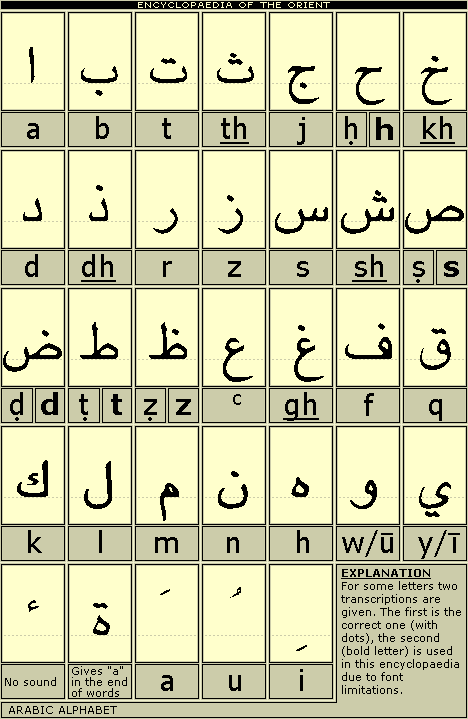
Arabic is a language divided into 3 separate groups: Classical written Arabic;
written Modern Standard Arabic; and spoken Arabic.
Classical
written Arabic is principally defined as the Arabic used in the
Quran
and in the earliest literature from the
Arabian
peninsula, but also forms the core of much literature up until our time.
Modern Standard Arabic is a
modernization of the structures of classical Arabic, and includes words for
modern phenomenon's as well as a rich addition from the many dialects spoken all
over the Arabic world.
Spoken Arabic is a mixed form,
which has many variations, and often a dominating influence from local languages
(from before the introduction of Arabic). Differences between the various
variants of spoken Arabic can be large enough to make them incomprehensible to
one another. Hence it could be correct to refer to the different versions as
separate languages named according to their areas, like Moroccan,
Cairo
Arabic, North Syrian Arabic etc.
SACRED LANGUAGE
 Arabic also has a dimension of being a sacred language, as it is the only
language from which the Quran is believed to be fully understood all
translations will reduce the quality of the revelations of God.
Arabic also has a dimension of being a sacred language, as it is the only
language from which the Quran is believed to be fully understood all
translations will reduce the quality of the revelations of God.
Arabic is based upon a very strict grammar, in which nearly all nouns and verbs
are built from a stem of 3 consonants. From these 3 consonants, a large range of
words are derived there are 10 forms of verbs, there are a number of nouns
which can be both feminine and masculine. As an example, s-l-m is the root of
the words Islam, muslim, salam
(peace), salama (safety), in addition to many others.
Arabic grammar is fairly simple compared to Western languages, but the language
has a richness in its used vocabulary that exceeds most languages in the Western
world.
THE LETTERS

Arabic writing is an alphabetic script, based upon distinct characters, adjoined
to other characters, which in most cases change their looks depending on where
they stand in the word. The Arabic alphabet developed from
Nabatean
characters, one of the West Aramaic languages of the ancient Middle East.



Arabic writing is put together of 28 signs, where 3 have vowel qualities (a, i,
u, but i is often used for the letter y, and u often for the letter w). Since
some regions of the Arabic world have different dialects, extra letters have
been added. The sounds that are not covered by standard Arabic are: p, g, v.
These are written almost like the letter that comes closest in standard Arabic,
but with an extra dot.
The following Arabic letters
does not have any correspondence in the Latin alphabet: kh (equals German
ch), gh (a softer version of kh), cayn (guttural stop, but
clearly pronounced from the back of the throat), th (as in English),
dh (softer version of th), sh (as in English) and strong and
emphasized versions of the letters t, d, s, z, h.
One letter, called hamza, is
not even pronounced, other than as a stop. In transcriptions it is marked with a
' only.
Vowels are not letters, only
signs added to the letter preceding them. In most cases the vowels are not
written, so that the name 'Muhammad' is written 'mhmd'. The vowels are normally
only indicated in special cases, like where there is doubt about the correct
meaning of the word, and in reading books for school children. There are also
"long" vowels, and these are written, and in transcriptions they are marked with
lines over or under the letter. Due to limited fonts on computers, this
encyclopaedia writes such letters like this: ā, ī, ū.
There are 3 declensions (nominative, accusative, genitive), and 2 tenses
(perfect and imperfect). In general, sentences are built up as
verb-subject-object constructions.